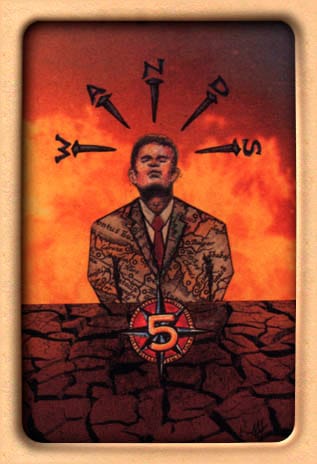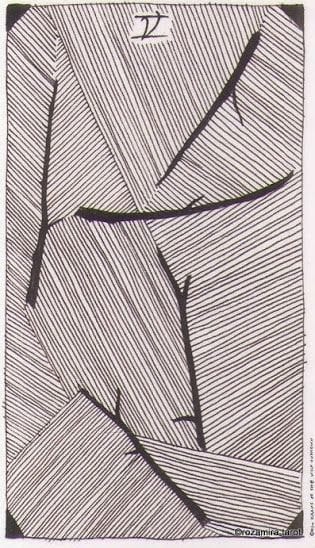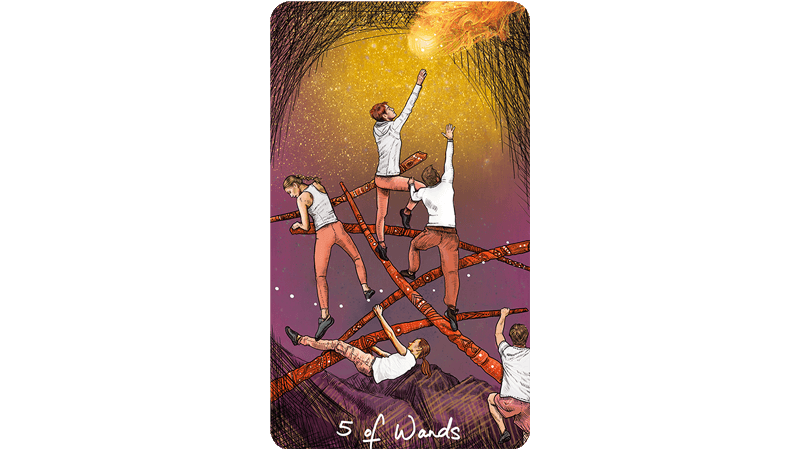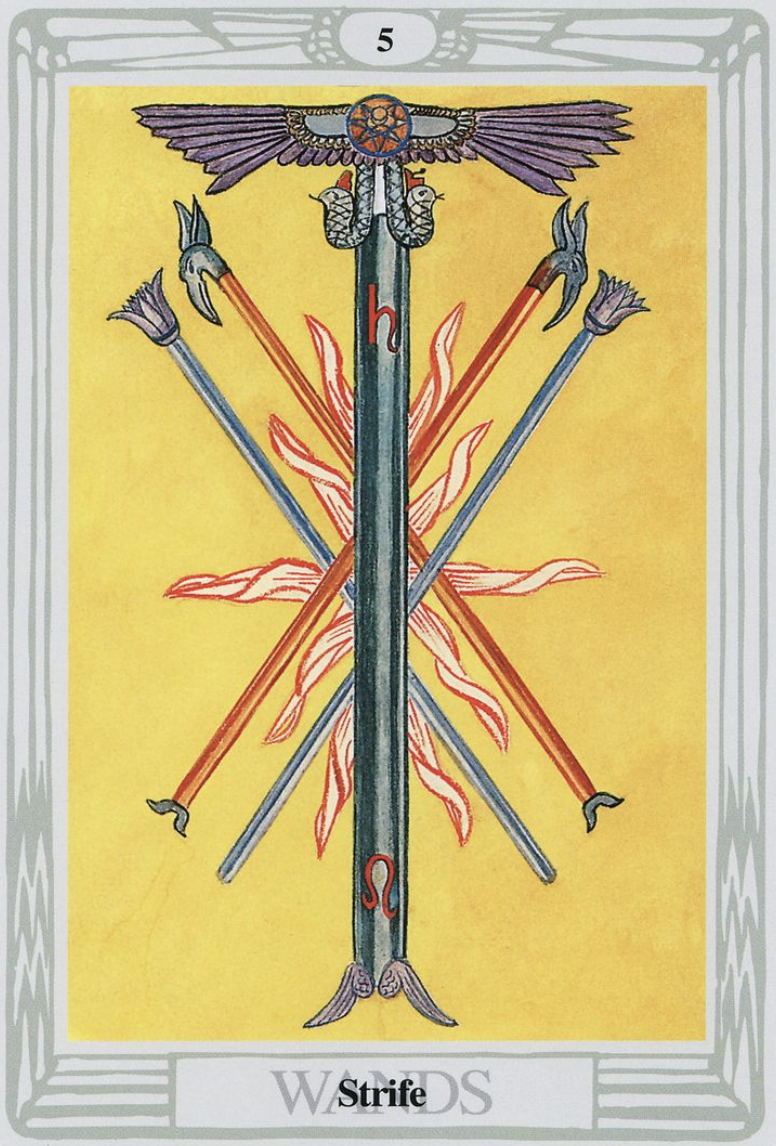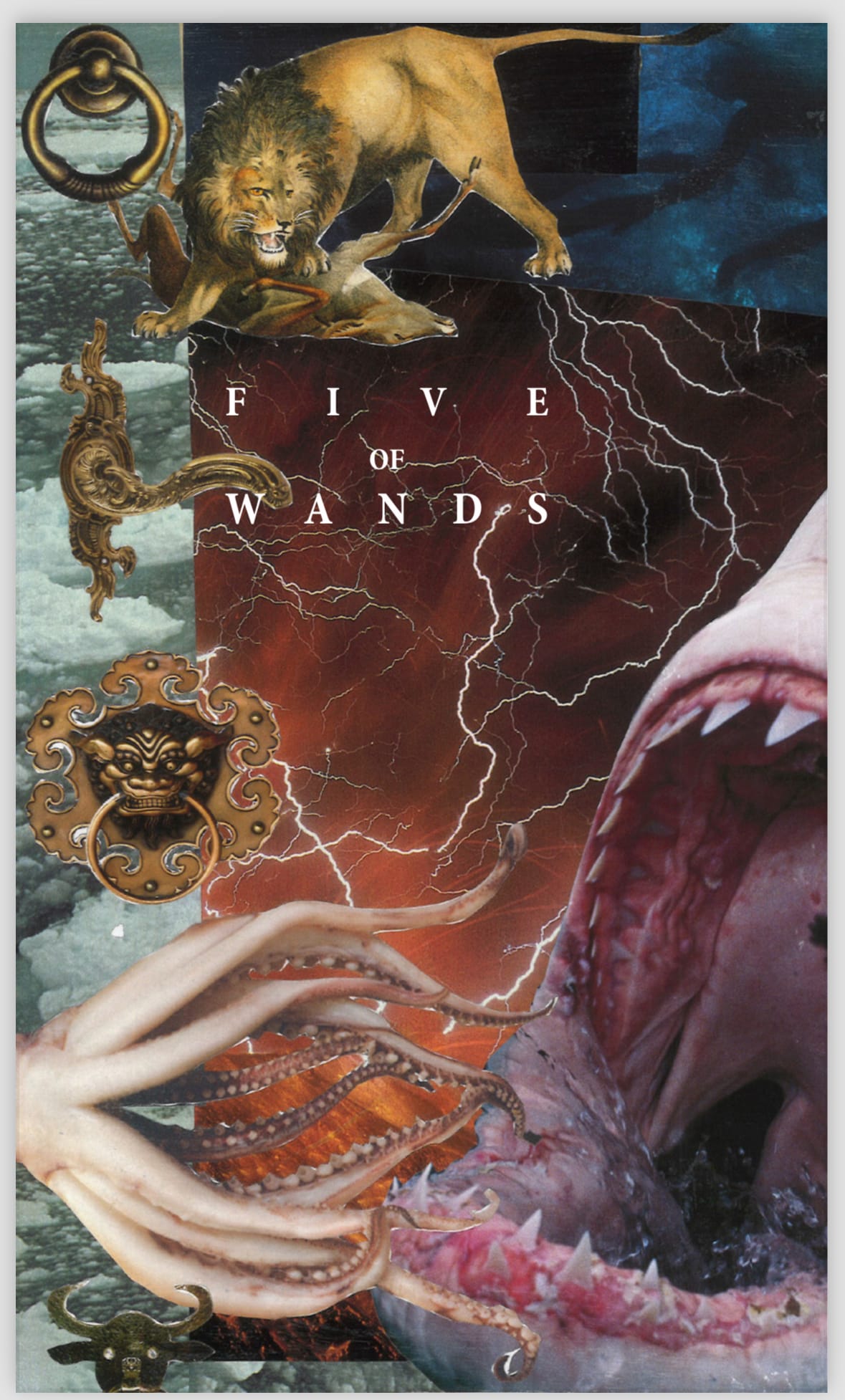Five of Wands
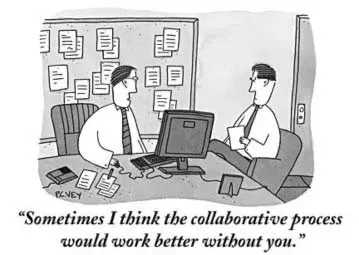
In The Rider Waite Colman Smith deck, the Five of Wands depicts five people, each holding a large stick (or wand) in a big ole creative clusterfuck. It looks like they are trying to build something, but they cannot figure out who’s in charge, what goes where, or even what it is they are supposed to be building. Look at these idiots. They lit the instructions on fire. They’ve all got their own ideas. They are thirty seconds away from beating each other to death.
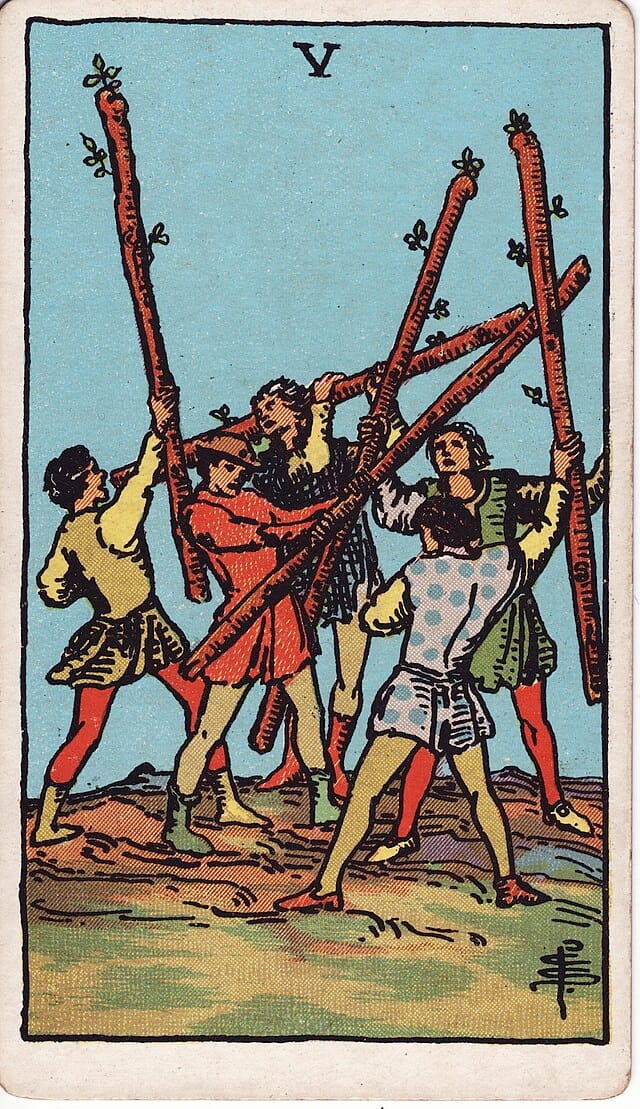
The five of wands is about creative conflict. When you receive this card in a reading, you’ve reached an activated pressure point in the creative process (either within your own head, or in relationship to outside collaborators). Sometimes the five of wands indicates that your ego or competitive spirit is getting in the way of the best way forward. Generally, I find if your feelings are being hurt in a collaboration, or if you find yourself feeling disrespected or needing to prove yourself, jockeying for position, or feeling vulnerable and scared … there is something wrong.
In Hollywood, the notes process is a necessary evil (and at its best, a necessary good). But! There is a right and wrong way to give notes, and turns out, I am the arbiter of the right and wrong way to do it. Pull up a chair, friends. Let's talk about notes.
Receiving notes makes you better at giving them. Anyone who’s job it is to give notes should be required by law to do something personal that they are proud of and then receive notes on it. All art is personal. Notes are shitty. That doesn’t mean they aren’t necessary, but it never feels good to get feedback that isn’t one hundred percent glowing praise. You thought you were saying one thing, they heard something else, and now they have the audacity to tell you. It sucks. Let’s just acknowledge that. It SUCKS.
Luckily, I have people in my life who can note me without activating my fears, anxieties, ego, self-hatred, and demons. These are people I trust implicitly, people who have made their positive feelings about my abilities known to me, people who’s notes come from their belief in me, not their own fears or judgement. This does not mean that these people give me notes that are easy to implement. On the contrary! Some of the toughest notes I’ve ever gotten are from my husband, who is an annoyingly brilliant writer and who believes in me. Sometimes his notes are rough, but I always hear them through the lens of “I think you’re so talented that you can make this better.” One of my best friends and favorite collaborators, Lila Neugebauer, has sat across from me at a table and cut chunks of my dialogue while I watch. She is allowed to do this. She and I frequently tell each other how much we love, respect, and admire each other’s work. I trust her implicitly. She is always helping me carve out the best version of my creative intentions, and it is always in my best interest to let her.
Some of the best and hardest notes I’ve gotten are from other writers I admire. For example, I’ve received the note “make better” in the margin of a script. If you’re not a writer, you can’t give a writer that note. And if you are a writer, you can only give that note to a writer you admire (who knows you admire them). The writer who gave me that note was my boss, but he was also someone who made his positive feelings about my work known, and he also took the notes I gave him. We had a shorthand, I knew he liked my writing, and so I heard “make better” and I went ahead and made it better.
I have received terrible notes hundreds of times in my life, notes that feel dashed off or careless, notes that do not even engage with what I have written but instead speak to something from the note-giver’s own unknowable expectations. I have received notes that feel like daggers, notes that feel like a game of pin-the-tail-on-the-donkey ("I don't like this, but I don't know what it is I like... I'll know it when I see it"), notes that make me want to scream, notes that drip with condescension, notes that are so stupid I would laugh if I wasn’t already crying.
A writer friend of mine once received the note, “Tone down the subtlety.”
I asked some of my favorite artists (writers, directors, and actors) to tell me the worst note they’ve ever received, and boy did they deliver. The people I asked are among some of the best writers, actors, and directors in the business (humblebrag) – truly, I wish I could tell you the identities of these geniuses, but I promised anonymity. Suffice it to say, even the greats have to eat shit from The Man every once in a while. I've included the list of terrible notes here, because if you're a creative person, this is going to make you want to scream and cry, but it will also make you feel a lot less alone:
Bad Notes To Writers
“Women don’t have sex problems until they are 40” (this from a man on a script about teen girls / coming of age / sexuality)
Early in my career, I wrote a story with a transfem main character and an editor told me this character lacked "phallic access," whatever that means. :/
“I just don’t like her” about a protagonist
“The writing is beautiful, but I have no idea what you’re actually trying to say, or what you feel about anything.”
"The data says people love mystery."
“As for me, well. i guess... i like my cookbooks to be sex-free. i dunno, maybe i'm the weirdo here.”
“You should change the title so people know this isn't for men.”
There were a few poems I wrote that were part of a huge project and undertaking exploring a subject that was deeply personal and traumatic to me, and I sent them to the editor of Poetry Magazine for consideration. He rejected them by writing to me that he can tell I'm a "blammo" writer (sir, what? what even does that mean?) But for him, these poems were “just not it." The poems would end up being published by a little known editor at the time named Roxane Gay, which would lead to the publication of a book that changed the trajectory of my entire life for the better. Oh, and that editor was fired some years later. Thank you for coming to my RevengeTalk.
“Can our sexual predator also kill her? We’re all feeling pretty uneasy about just doing a straight rape story.”
I was working on a project about elderly vets who'd been drafted into the Vietnam war as young men but these idiot producers wanted one of the leads (the black one, obvi) to also have been "heavily involved" with the early civil rights movement with Dr. Martin Luther King and I pointed out that that was quite literally historically and physically impossible - I explained the character could have been, at their eldest, like 8 years old during the Civil Rights movement - and they got very stern and ordered me to "make it work.”
A producer pointed to a single joke and said “that's the worst joke in the script, just change that one”– and I was like, it's actually literally the best joke in the script – and then I was proven right, quantifiably, by testing, which happened in front of our eyes together.
"Well I guess we have to throw the whole story out because of your gay note" (the note was me pointing out that a gay man could not go on a fun story at a blood drive.)
"Some people don't like to laugh, some people just like to smile.”
"Why have you only made these two changes?" - I was asked to make exactly those two changes which would make it “perfect".
"Can you just tell, don't show here?”
"The movie Crazy Rich Asians was a huge hit, I really think one of the characters should be a crazy, rich Asian.”
"Why are there still so many Black people in this scene?" They were regular supporting characters needed for the scene and to plant a seed for the next episode. This was after already reducing their screen time per an earlier note. They were removed entirely in the end.
"Should this actually be episode three?” (on episode 2)
"I don't think ‘coming out’ stories feel real anymore, people are just out now."
"Let's set a call because the current track isn't working and given the notes that not only we have, there are still questions that haven't been answered in one and two. Three gives us the insight that we need to hook audiences faster. Your previous show was built for a typical network release cadence with longer episode orders which had plenty of breathing room. Frankly we don't have the time/real estate for a slow burn. We need to get into these characters sooner and deliver on the premise of the show. Also let the record state, joking aside none of our notes were an implication of laziness, we respect you as creatives. We remember the series doc but don't feel we need to be prescriptive in following that pattern, we are in the building stage of the series. At the end of the day we aren't giving a note to blow things up, we are hoping to prove out the format.”
"It's soooooo depressing, does she HAVE to be dead?" This on a murder show where yes, the victim has to be... dead.
"That's too gay."
"I'm a yellow person. I really like yellow. And this is just feeling a little more blue than yellow.”
"Please make CHARACTER'S outfit more shoppable."
"Get rid of the current teaser and come up with something avant garde."
"Can we just pretend that World War 2 isn't happening?"
Bad Notes to Directors
“Can you get him to emote more?”
"Take out the conversations about race." The entire film was about Black kids and their experiences. I take the conversations out, I have no film. Absolute nonsense.
Bad Notes to Actors
“Can you give me a watery eye for this one?”
"Your character is ME! Just BE ME!"
“She needs to emit, like, a pearly mist”
"Do it like a grown up this time"
I went to a first costume fitting (for a job I already had) without styling my hair or doing my makeup in any kind of elaborate way. I will remind you that I was around 26 at the time and GORGEOUS. After seeing the photos, the director called my manager to tell her I looked "ungroomed and unshowered."
I was told by a Black female director to “pretty it up” for my call back. I was 18, had on a full face of make up and heels. I still honestly don’t know if this was a comment on my natural hair or my complexion.
"In auditions, always find a way to walk around in a circle so they can check out your ass."
"Act better."
“Funnier.”
"You'll probably always work, but you're not vulnerable enough to be a lead."
"Do it one more time... these are just people living their lives in the eighties... go again."
"Yell, but in a whisper."
When I was starting out in showbiz from someone who I was trying to get to manage me: "You're not funny." And, "Wear make-up and high heels." (to audition for The Office! Never got the audition).
"Do you have a lisp?"
In high school, I forgot a line on stage, and went blank. The choir teacher told me I ruined her year in front of everyone.
From a comedy tour of all men, one of the comics: "That bit you're doing where you make fun of men? No one likes it, it's not working."
"Don't do that arch thing you do. They want it grounded in reality."
Voice over: "You're underwater, screaming." HOW?
"Your character is a hater."
This one wasn't given to me, but I overheard the director give it to the actress opposite me (on her first day of filming!): "... okay, so the audience needs to fall in love with you in this moment!" .... dude. Can't think of a dumber thing to say to an actor. As soon as he walked away, I told her "he has no idea how to talk to actors, please forget everything he just said."
"Do it like every man's dream girl."
"I'd love to see you be a little more feminine on stage." - an improv teacher
"Again, just more believable and can you cry at this part?"
"Study ugly actors, because you're not pretty enough to be a leading lady."
"Your character is the kind of woman who wears pads not tampons. Be more like that."
As you can see, these horrible notes were often laced with racism, sexism, and homophobia. As a general rule… don’t do that.
So, how do you get through a Five of Wands moment? How do you recover from a bad round of notes? How can you distinguish between a bruised ego and your inner genius? How do you know when to fight back or when to roll over? And how in the world do you give a good note?
Let me tell you what I've learned.
It takes me a moment to distinguish between hurt feelings and my creative center. On my best days, my first reaction to any note is to bend over backwards to people please regardless of what the story requires. On my worst days, my first reaction to any note is a guttural scream. Neither of these are helpful. This is why I ask my collaborators for written notes. Written notes require thought. That doesn't mean they will not offend you to your core, but at least you'll get to have the initial reaction in the privacy of your own home. My initial reaction (which is almost always explosive, dramatic, and sort of insane, regardless of what the notes actually say) is usually followed by a begrudging acknowledgement that the notes are fine or even pretty good. At the very least, if I take a moment, I can decipher the note behind the note, and it’s only a matter of time before solutions are flowing. It is in everyone’s best interest to let me have my initial reaction in private. By the time I’ve slept on it and we’re on a call, I’ve already started brainstorming solutions.
It's important to get a gut check. After your initial reaction, ask a trusted creative friend to read the notes and help you translate them. Try to distill the notes down to their very essence – if you hate a note, it could be because it's bad, or it could be because it rings true to you on some level but you don't yet have an answer (or maybe it was worded poorly, but there's something worth listening to). Since you've given yourself the opportunity to bitch and moan about it first, by the time you actually engage with the notes, it should be easier to wade through your ego to get to a solution.
Trust is key.
If I don’t trust the person giving me the notes, or if I sense that they don’t trust (or like) me, the notes feel like personal insults instead of creative feedback. An enormous part of the early stages of any creative process should be about building trust. I work best from a feeling of trust and respect. If I trust you creatively, and I feel safe in your hands, you can give me pretty much any note and I will engage with it.
Here’s how this translates into the way I give notes. An enormous part of my job is giving notes. I try my darnedest to foster a work environment where people feel safe taking creative risks. I believe people do their best work from a place of curiosity and safety, not a place of fear. I spend a lot of time vetting people in the hiring process. If I’ve hired you, I believe in you, and I know I have something to learn from you. I make a point of telling my collaborators that. I want them to take risks. I want them to feel safe. You’re here because I want you here, because you have something to offer, and because I trust your judgement and creativity. If I’m pushing you for something more or different, it’s because I know what you’re capable of, and I believe in your abilities. I would never tell someone “make better” if I didn’t think they could.
This is obvious, and yet… Start off your notes with a compliment. It has to be a real compliment. There is something you liked. Something that made you laugh, smile, cry, feel something. Start with that. Spend a moment with your own reaction before you write it down. Does this need to be different or is it just not how you would do it? It’s useful to understand where someone else is coming from before you start tearing down the thing they made. Sometimes things need to be torn down. Sometimes we need to start over. But before we do that, let’s make sure that’s in service of the work and not our own egos.
Offer solutions. Especially if you are a writer giving another writer notes. Don’t just tear things down. It is helpful to offer a solution even if it is “the bad version.” When someone tells me, “Not this, this is obviously the bad version, you’d make it better, but what about something like….” they are giving me a great gift. Hearing an idea sparks more ideas. The bad version gets us to the good version. Saying “this doesn’t work” (especially if you are a writer noting another writer) without a solution is just annoying.
Give your collaborators the benefit of the doubt. When giving notes, it’s nice to acknowledge that while you may not fully understand a choice, that doesn’t mean the writer didn’t. There’s a difference between saying, “I feel like you’re circling something really interesting here, but I’m not sure what it is yet” and “this doesn’t make sense.” Language matters. Don't be a dick.
If you are giving notes to creative people, but especially actors, acknowledge the vulnerability of their work. There’s a room full of people staring at them, dissecting every twitch of their eyes, every inflection and lilt of their voice. They’ve been told where to stand and how to move — sometimes they’ve been told to do something that doesn’t make sense to them and they are figuring out how to make it work. If they’ve only had a chance to do one take, do not give them a note yet. Let them get the cobwebs out first. Learn about their process. Ask them how they like to receive notes. Some actors love to talk through every little micro beat. Some actors are extremely technical and like to know exactly where the camera is at all times. Other actors are literally another person while they are working. Acknowledge that different people work differently, and approach your collaborators with curiosity. Also, don’t treat them like a meat puppet. Asking for a “watery eye” is insane.
Remember that a lot of creative people have been traumatized by former collaborators. Sure, some people are just assholes, but sometimes people are defensive because they have been burned in the past. If you’re a writer, you don’t need to be afraid of actors. If you are clear, communicative, and collaborative, actors will reciprocate. If you are dismissive, or you withhold information because you're afraid to talk to them, you have not built the trust required to make something great.
Actors, being mean to a writer will make them defensive. Instead, say something nice to a writer before you tell them what you want to change.
This is a multi-billion dollar business FILLED WITH SENSITIVE THEATER KIDS.
Let’s all be kind to one another. Treat others how you would like to be treated.
Don’t give notes just to give them. This is not an opportunity to prove how smart you are. This is about making something. If your instinct is to "teach" someone something, you're probably going to sound condescending. Focus on solutions. Use your empathy. Put yourself in someone else’s shoes. Be kind. LISTEN.
Be direct. It isn’t kind to try and trick someone into doing it your way. If you know exactly what you want, just say it. At the same time, acknowledge that there might be another solution. You can say something like, “This is prescriptive, but…” And then when your collaborator (who you have built trust with) has a different solution than the one you envisioned, listen to them. If you’ve spent the time to build trust, two creative brains are better than one.
The work of art is messy. The work of art is personal. The work of art is sensitive and vulnerable and filled with emotional triggers. It’s also work. I get paid to write, and I get notes from the people who pay me. They are entitled to their opinions and they expect results. I can work with bad notes, but my best work comes a process built on trust and respect.
When you find yourself in a Five of Wands clusterfuck, the problem is almost certainly about communication. It’s time to get honest with yourself and your collaborators. Listen. Build trust. Offer solutions. Acknowledge work. Don’t be an asshole. Approach problems with curiosity. Keep your ego in check. Be kind.
Please share the worst note you've ever gotten!!! The comment section is open.
